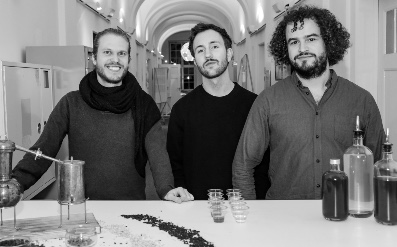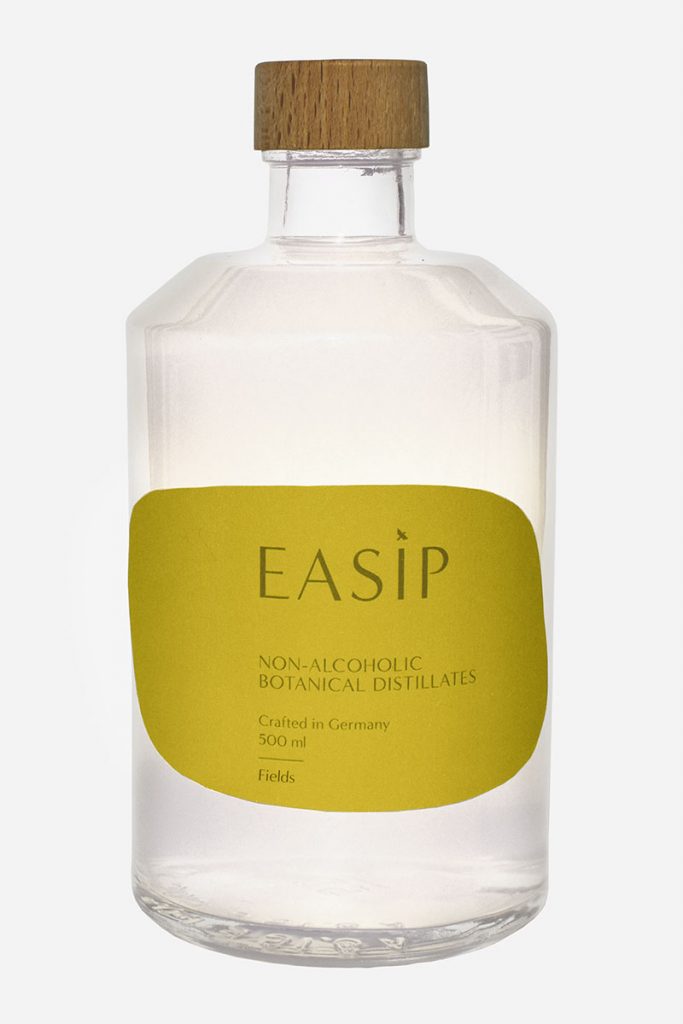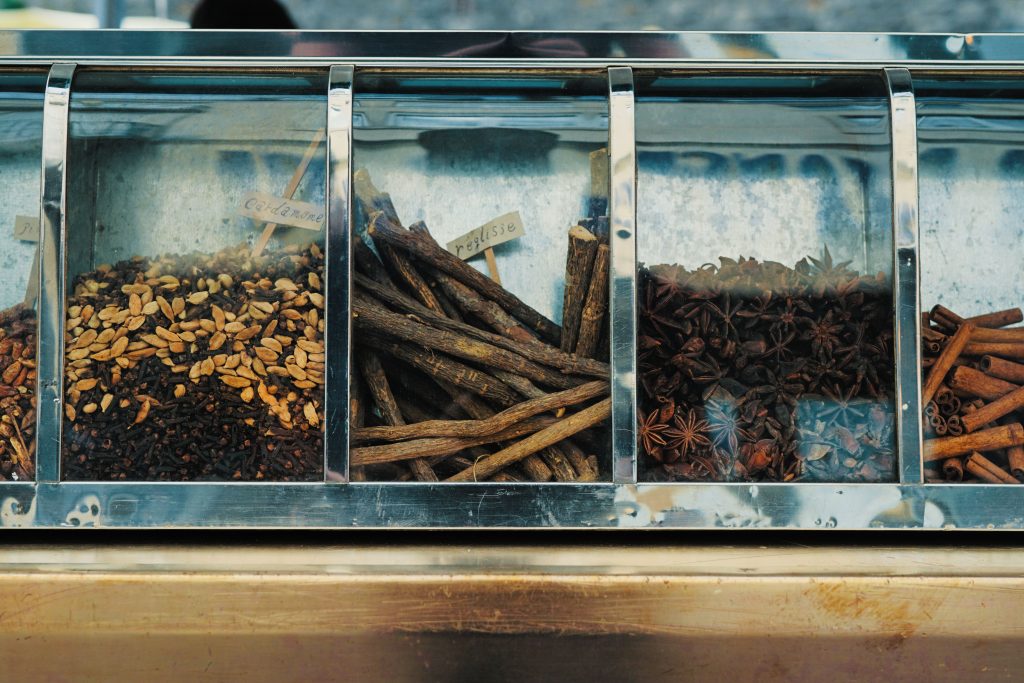
Hello you three,
How did you develop Easip? How much time did you need?
We started with a small pot still, individually distilling more than 100 different botanicals to better understand how different botanicals come out in a distillate and how the smell and taste were affected by different methods. We then took some inspiration from literature and expert knowledge e.g. on flavour pairing (and our own preferences) to start blending different distillates together. Once we had some blends that we liked, we tested them with a larger audience: friends and family, some mixologists and focus groups. Overall we spent quite a few month doing this over and over again, before we came to a “sketch” recipe that we and – quite a few people who tried it – liked. Getting from the sketch recipe to a final product that met our standards and that we could offer to customers took almost as much time.
Do you have experience in distillation before starting the brand?
Milan is a studied food technologist. During his time at TU he surely learned the theory. But working with a real life still was new to all of us. By now we can all say that we have quite some experience to handle the stills we use for new product development.
Do you have your own facility?
No, we have a few small stills that we are using for recipe development, but we work with partners who own the equipment to produce EASIP.
Did you know immediately what you wanted to achieve?
In terms of ingredients we did not, but we always wanted to create a non alcoholic drink that has a more complex flavour profile than what is on the market. We think enjoying a good and complex drink does not have to go in line with consuming alcohol. With EASIP we want to create new drinking moments.
Which other nonalcoholic beverages inspired you?
Hard to say. We tried a lot of beverages in the process. There are great drinking vinegars, grape juices and outstanding teas, even soups or broths. In the end we were amazed of quality of distillates to catch rich flavours of botanicals we like.
What is the expertise needed to create a non-alcoholic adult beverage?
Patience and passion. You really should like to try new flavours when you want to develop an interesting recipe. Some “good palate” and a good memory for flavours helps. Having some experience in food technology and general operations also can help to launch a product.
Will you publish a complete list of ingredients such as the herbs and spices you use? Why?
We use 8 different botanicals in our EASIP Drinks. We usually disclose only about half of them. In EASIP Fields thyme, ginger, cucumber and coriander seeds create a fresh well balanced drink that can be enjoyed with a tonic. In EASIP Woods, oak wood, cinnamon, beet root and malt create an earthy flavour profile. The other botanicals make the products round. And leave some space for the consumers to guess.
Why did you go for the overpowering (at least long lingering) ginger note?
We just love ginger. It give the spicy note to our EASIP Fields. For some it might seem strong when you drink a shot of pure EASIP Fields. But if you want to a have a little ginger kick in your drink it has to be like this, because mostly it will be diluted in your drink. This way it ends up well in balance when mixed with a filler or in your favourite cocktail.
Do you use natural aromas or only your own herbs/spices distillates?
We do not use natural aromas. We only use distillates and extracts.
Can you tell me more about the different techniques you use (extraction? maceration? distillation?) ?
We combine the artisanal method of distillation with an innovative process for the production of essential essences. Similar to traditional steam distillation, steam flows through our botanicals individually in a still as slowly and gently as possible, adding rich fragrances and flavors. Selected botanicals with fine, sensitive aromas are processed in a modern, particularly gentle process at an extremely low temperature. The essential essences obtained are very intense and therefore very close to the natural taste and properties of the plant.
To ensure the highest quality and an absolutely pure taste, our botanicals are processed and distilled individually and in small batches. With a complex process that is individually adapted to the nature of the plant, it is possible to capture its true character in the distillate. The distillates are then matched and mixed in the final blending.
Do you use alcohol at any point in the process? If yes, which one, and how is the alcohol removed?
Depending on the botanical, sometimes alcohol is used in the process, sometimes it is not. But it is always used only in low concentration, so we do not have to remove alcohol.


What kind of water do you use?
We did not seek special spring water to create our products, as we think it does not make sense to transport water with trucks through the country. The water we use was tested and is of great quality. We still filter it and it is much smoother than the hard water we usually have in Berlin.
Why do you still refer to gin when describing your product whereas there is no prominent juniper note?
We actually dont refer to gin when it comes to the flavour profile and the use of EASIPDrinks. We deliberately refrained from using juniper in our products. We think that this actually makes our products more versatile in use than other products with a dominant juniper note.
Of course gin comes up very quickly when we talk about botanicals and our EASIP Fields goes well with a tonic. But the fun really starts when you create cocktails with it and combine it with other interesting ingredients. The EASIP Woods is a whole different story. It definitely has nothing to do with Gin. It is also not like a whiskey. Some people it reminds of some whiskey notes, some it reminds of wine barrels, some of their favourite pastries. Complex flavours and smells create a lot of memories. That is just part of the drinking experience.
What is the main challenge in creating a nonalcoholic adult beverage?
Creating any type of beverage brings a lot of challenges. I would not know where to start. A usual framing is that “non-alcoholic” is somehow sweet and often sugary, and “adult” often contains alcohol. To create something non-alcoholic and without sugar is difficult, because both can carry some flavour and add to the mouthfeel of a beverage. Also most consumers expect either one in their drink.
I often heard while offering nonalcoholic tastings « so in the end, this is basically flavoured water i could do myself in my kitchen, right? » which I of course denied, but I’m curious, is this something you heard too? And if yes, how do you respond to this?
I am sure most of our customers can do outstanding things in their kitchens. Most still like our drinks and appreciate having a complex drink to enjoy.
As we started in the kitchen ourselves we know that you don’t get that far without the basic equipment- distillation is very complex – most of our consumer get that very quickly.
Apart from that there is little information available on the different flavours that botanicals carry. Even if you have a gastronomy background and the best rotavap it will still take you quite some time experimenting before you can pour yourself a drink with what you have produced.
Why not checking their website right now?

